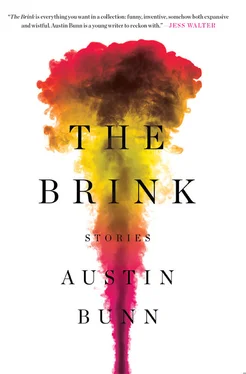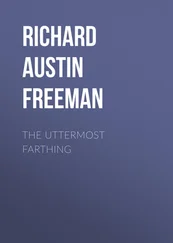Kyle looked out at the lawn and seemed to resign himself to his answer. Leland adjusted his seat cushion. The screen door slammed into its frame as Kyle walked across the lawn to the house and never returned.
6.
The basket of soaps, the “Bless This House” wooden carving on the wall of the bathroom: a woman had been here, Kyle thought, but a woman had also bolted and left the geegaws. The toilet roll had run out. The medicine cabinet seemed raided. It was as though Barr, too, was subtracting himself from the place. Maybe this is what made him diffuse, or desperate to have someone to drink with. It surprised Kyle that Barr had not already busted a move, given the private nature of a screened-in sex gazebo. He kept waiting for the other shoe to drop, for the wandering hand, for the lurching kiss, no doubt with snake tongue. Maybe Kyle’d be wrong, and the pretext of back channel about the Mountain Justice people was, in fact, just the text. Maybe Barr had no ulterior motive. Or maybe Kyle was supposed to make the first overture. Some prostitutes got paid just to hang out, didn’t they? Was that what he was, an almost-sex worker? The feeling was exotic and, he had to admit, credentializing.
He finished pissing and wandered the ground floor of the house. The dining room was missing the table and chairs, so a chandelier hung over a rug. A leather armchair ruled the center of a sunroom, a scattering of papers around the base. He saw the legions of bottles, an empty, plaid dog bed, so much empty. In the kitchen, on the marble island, was Barr’s laptop, playing the endless pipe screen saver.
Then Kyle stopped. On the counter was Squirrel’s blue bandana, folded into a square, with coins on top. What the fuck was this doing here? How had Barr not seen fit to give it to him, the only person to whom it would matter? Kyle took it and held it up to his face. Squirrel’s scent was gone, the cotton laundered. A memory came: Squirrel’s terrified face on the ground, one bloodshot eye, not understanding how irrevocable the day had become. He would never be the same, a venturesome boy on the edge of a dozer blade.
Kyle looked back out to the gazebo, where Barr awaited, and felt the grip of a new loyalty take hold.
7.
It was early morning on the mountain, the sky gray and billowy. They’d have rain and the site would turn into a swamp. In the office, sitting across from Leland in a creaky wheeled chair, the site manager took off his sunglasses and pinched at the bridge of his nose. “Leland, just tell me if I’ll have a job in three months.” Leland had no answer.
He left him and fled, down the ridge, boots crunching through the shale.
Two mornings back, the paper had started publishing everything — the extraction numbers, the data on the looming nitrogen levels in the creek beds, the next run of mountains. All taken from his laptop, gone missing, after that afternoon with the boy. Origin stock had already started its slide, and the television would run their first report that evening. The board figured a leak inside the company, and secretaries had been let go. But it was only a matter of time before it got traced back to Leland. He was convinced now that the encounter had been plotted. What could he say, to anyone? That he hired a spy. Even Merrill had called him, concerned about the news stories, but he stopped answering. He was alone now, at the bottom of a hole with his mistake.
Leland came to the clearing where the oak tree remained on its side, the leaves brown and the root-ball dry. He noticed names carved in its bark, initials and other lettering that ringed the trunk. People had been here once and left their mark. The tracks of the dozer remained in the dirt, the place where the boy fell. The grasses in the cemetery were beginning to explode without the canopy to starve them. And nearby was an older woman with a shovel and bundled tarp on the ground who watched him with suspicion. Her long gray hair had been pulled into a ponytail and she wore a T-shirt printed with what looked like the photo of a cat.
“I know who you are,” she said. “Go get away now.”
But Leland moved toward her. The siren blared back at the site. The two-minute hazard warning. A long orange chain of fuses, like a braid of Christmas lights, were set into drill holes sixty feet deep. Fly rock would shower. The tremor could shatter an ankle.
“Didn’t you hear me?” she said.
The grave markers were mostly broken, mossy remnants. Her small stone was one of the newest, a piece of granite with “DOLLOP” chiseled crudely into the rock. A green collar lay on the stone. It was a pet cemetery. A shaft inside him collapsed in: she was going to dig up her animal. You could never know what mattered to someone else, or how much. The thing was: to matter at all.
“Is this your cat?” Leland asked. “Let me help.”
She grimaced. “You have no idea what you done.”
It was then he saw, underneath the tarp, the branches. The roots bundled in muslin and twine. It was a sapling behind her, laid sidelong. She was going to set the tree in the earth, give the grave some shade.
But then the blast cap fired and his feet felt the rumble first. The bang echoed, like a gunshot, into the valley. A dank smell, the spent fuses, materialized in the air around them. The mountain, finally, was open.
When You Are the Final Girl
Nobody wants to know where monsters come from. But I know. Because I am one. They come from a soundproof room, beige and white, with a door that seals for positive oxygen flow. Monsters come from all around to be born there, in the pure oxygen. Still, the place smells like Vaseline and burnt toast.
Outside the room are six beds, hidden by curtains. There, the nurses put cadaver skin on you because it has nutrients your monster skin needs. An Asian nurse lady, the one who wasn’t afraid, laid gray pieces of dead guy on my face. When her fingers patted the gauze, I heard a scream. It came from me, a gust from inside, but I couldn’t find where.
She gave me drugs to forget my life before, as a person. But the drugs stopped words from having beginnings and endings, so I got what was in between: giant vowels, jets of breath. My mother brought me magazines and my music. I could only put the earphones in one ear, the ear that remained, but music saved me. Movie soundtracks saved me. “Randy, I need to tell you something,” my mother said. “He’s here. He’s in the building.” The boy that made me a monster was on another floor, getting saved. I asked the nurse to push as much forgetting into me as she could.
“You’re going to feel an itch soon,” the nurse lady said. She was a hundred years old and every one of those years she’d taken the bus. But her fingers were soft, the only fingers that I allowed. “When you feel it, you should think far away,” she said. “Think of your favorite place.” I thought of my last night as a person, in the mall parking lot, and Melissa Carmichael’s lap, Melissa whom I barely knew, who never came to see me. Good-bye, Melissa.
After a week, a baby monster came. She had crawled into a heating vent and got stuck, pressed against hot metal. It’s dangerous to give babies the drugs, but she shrieked so much the doctors gave them anyway. Then she got quiet and I heard, through the curtain, the clicks and the wheeze of a bike pump going all night. At some point, the pump stopped and her mother gasped and wept. Maybe she should’ve fixed the vent. All of a sudden, I was crying too, except it felt like my face was tearing apart, like a paper bag I was done with. That was when my itch came, hot and unrelenting. Next day, the nurses had to tie down my hands.
One day, my mother brought me the newspaper. She put her hand on my arm and said, “He’s dead, Randy. It’s right here.” His high school portrait, right above the funeral notice. They’d tried lots of things but his heart gave. My mother let the smallest smile happen. I saw every muscle doing its work.
Читать дальше











